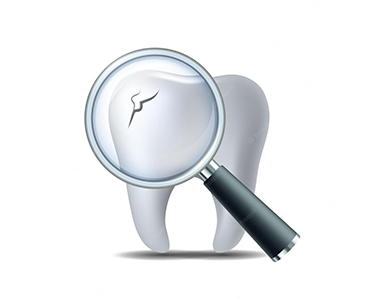
What is a cracked tooth?
A cracked tooth is a tooth that has become broken.
Do all teeth crack in the same way?
No. Teeth can crack in several different ways:
Cracked tooth
This is when a crack runs from the biting surface of the tooth down toward the root. Sometimes it goes below the gum line and into the root. A cracked tooth is not split into two parts but the soft, inner tissue of the tooth is usually damaged.
Craze lines
These are tiny cracks that affect only the outer enamel of the tooth. They are common in all adult teeth and cause no pain. Craze lines need no treatment.
Cracked cusp
The cusp is the pointed part of the biting surface of the tooth. If a cusp becomes damaged, the tooth may break. You will usually get a sharp pain in that tooth when biting.
Split tooth
This is often the result of an untreated cracked tooth. The tooth splits into two parts. Vertical root fractures are cracks that start in the root and go up towards the biting surface.
Why do teeth crack?
Many things can cause teeth to crack, such as:
- Excessive tooth grinding can put the teeth under enormous pressure.
- Large fillings weaken the tooth.
- Chewing or biting on something hard: for example ice, boiled sweets, fruit stones or meat bones.
- A blow to the chin or lower jaw.
- Gum disease, if there has been a bone loss. This could make the teeth more likely to suffer from root fractures.
- Sudden changes in mouth temperature.
What Are Some of the Causes of a Cracked Tooth?
There are a number of reasons that a tooth might crack. These reasons include:
- Biting down on hard foods like ice, hard candies, and nuts
- Stress that leads to jaw clenching or grinding
- Chewing unevenly
- Loss of tooth structure due to wear or large fillings
- Exposure to temperature extremes (such as eating hot food and then immediately washing it down with an ice-cold glass of water)
- Brittleness of teeth following a root canal
What Are Some Signs that I May Have Cracked My Tooth?
Unfortunately, identifying a cracked tooth on your own may be difficult. Oftentimes, there is a vertical hairline fracture that may be nearly invisible to the human eye. Sometimes, these tiny cracks cannot even be seen on X-Rays. However, there are 5 warning signs of a cracked tooth of which you should be aware:
- Tooth pain when biting or chewing. This can be a good indicator of a cracked tooth; although you might not experience the pain every time you eat. It may only occur when you eat certain foods or bite down in a certain way.
- Lack of constant pain. Unlike a cavity or an abscess, the pain of a cracked tooth is sporadic. If you are not experiencing chronic pain, you are likely to have a tooth fracture.
- Increased sensitivity. You may notice that you experience pain when biting into hot foods or drinking cold liquids. Possibly, you may even experience sensitivity when eating sticky, sweet, or sour foods as well. Increased sensitivity may be a sign of a cracked tooth.
- Infection. At times, a cracked tooth can lead to an infection in the gum line around the area of the fracture. This infection would look like a small bump on the gum near the tooth.
- No visible signs. Often with a cavity, you can spot signs of decay. For instance, you might see a dark spot on the tooth’s surface or a hole where the enamel has eroded. If you are experiencing tooth pain but you cannot see any obvious sign, this may be another indicator that you have a cracked tooth.
How is a Cracked Tooth Treated?
Treatment for a cracked tooth depends on the location and severity. Tiny cracks are common and typically do not even require any treatment. However, cracks that affect the cusp of a tooth may require a treatment procedure – possibly a crown.
Roughly 20% of cracked teeth require a root canal, and in some severe cases, the cracked tooth may need to be removed altogether. In that case, we can replace the tooth with an implant or a bridge.
What Should I Do If I Discover a Cracked Tooth?
Early treatment is important with a cracked tooth. If treatment is delayed, the crack will worsen and may result in tooth loss.


 Review Us
Review Us Review Us
Review Us